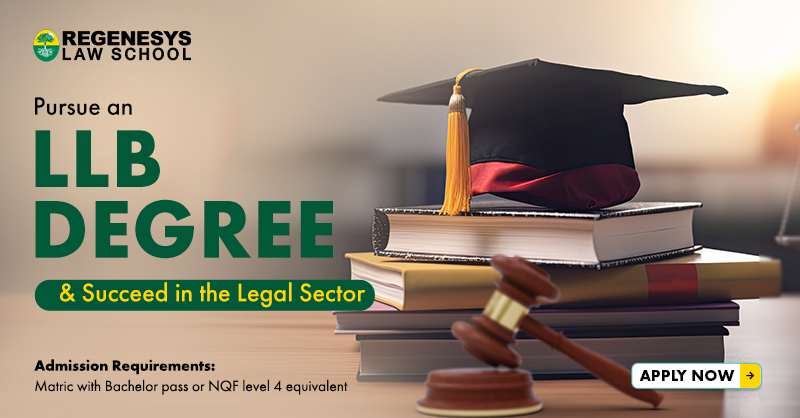The legal profession is evolving rapidly as technology transforms the way legal work is conducted and how LLB graduates build their careers. Innovations such as artificial intelligence for legal research, virtual courtrooms, digital contract management, and cybersecurity tools are changing traditional legal practices, allowing lawyers to handle cases more efficiently and accurately. These advancements require modern legal professionals to be adaptable, tech-savvy, and proactive in integrating digital solutions into their work.
This article includes an overview of technological advancements in law, the evolution of law firms, future opportunities and challenges for LLB graduates, and insights into pursuing an LLB at Regenesys Education.
Table of Contents

The Evolution of Law Firms
Technology is not just changing tasks; it is transforming the legal profession itself. The future law firm will be highly digital, agile, and client-centric. Traditional hierarchical structures are giving way to collaborative models where technology supports decision-making, workflow, and knowledge management.
For LLB graduates, this evolution means developing a hybrid skill set that combines deep legal knowledge with technological literacy. Legal professionals who embrace digital tools, data analytics, and innovation will be better equipped to lead law firms and provide value in a fast-paced environment.
How Technology Is Changing The Practice Of Law For LLB Graduates
The technology is transforming the practice of law from document automation to digital case management systems, streamlining traditional processes and enabling lawyers to work more efficiently. For LLB graduates, understanding these changes is crucial to remaining competitive and delivering high-quality legal services.
Some ways in which technology is changing legal practice include:
- Document Automation: Streamlines the creation of contracts, agreements, and legal forms, reducing time spent on repetitive paperwork.
- Digital Case Management Systems: Centralise case information, track deadlines, and improve collaboration within legal teams.
- Legal Research Tools: Leverage AI and databases to quickly find precedents, statutes, and relevant case law.
- Virtual Communication Platforms: Facilitate remote consultations, client meetings, and court appearances.
The Top Three Tech Trends In Law
As technology transforms the legal landscape, certain trends are emerging that are significantly changing how law is practised. LLB graduates must be aware of these innovations to stay competitive and deliver efficient, high-quality legal services. Understanding these trends enables legal professionals to leverage new tools, adapt to evolving processes, and prepare for the future of the law.
1. AI and Automation: The New Legal Assistants
Artificial Intelligence (AI) and automation are revolutionising legal workflows. Tasks such as contract analysis, legal research, and document drafting can now be automated, reducing errors and saving time. AI-powered tools serve as virtual legal assistants, offering insights and recommendations that would typically require hours of manual work.
For LLB graduates, proficiency in AI tools enhances productivity and positions them to offer faster, more accurate legal solutions, making them highly valuable in law firms and corporate legal departments.
2. Virtual Legal Services and Remote Collaboration
The rise of virtual communication platforms and cloud-based technologies allows lawyers to serve clients beyond traditional office settings. Remote consultations, virtual hearings, and digital document sharing have become standard practice, expanding accessibility and flexibility. LLB graduates who are comfortable with virtual tools can offer efficient and client-centric services in today’s increasingly digital legal landscape.
3. Cybersecurity and Data Protection
As law becomes more digital, safeguarding sensitive information is critical. Law firms and legal departments face challenges in cybersecurity and data protection, as confidential client data is stored and transmitted online.
LLB graduates must understand legal and ethical obligations surrounding data privacy, as well as practical measures to protect client information. Knowledge of cybersecurity laws and compliance standards is becoming an essential skill for modern legal professionals.
Also read the article, Study to Be a Lawyer in South Africa: Know Key Subjects Covered in The LLB Programme

Opportunities And Challenges Ahead
With technology rapidly transforming the legal sector, LLB graduates encounter both exciting opportunities and complex challenges. Innovations such as digital platforms, AI, and virtual tools are changing the way legal services are delivered, opening new career avenues while requiring adaptability, ongoing learning, and a careful balance between automation and professional expertise.
Grasping these changes is crucial for graduates seeking to succeed in today’s evolving legal landscape.
Opportunities:
- Greater Efficiency: Technology streamlines legal research, documentation, and case management, saving time and reducing errors.
- Access to Resources: Digital platforms and AI tools provide faster access to case law, legislation, and legal precedents.
- Diverse Career Options: Graduates can explore roles in traditional law firms, in-house legal departments, government, NGOs, or legal tech startups.
- Innovation and Entrepreneurship: Technology enables the delivery of new legal services, online dispute resolution, and legal consultancy ventures.
Challenges:
- Rapid Technological Changes: Staying updated with emerging tools and platforms requires continuous learning.
- Cybersecurity Risks: Protecting sensitive client information in a digital environment is critical.
- Balancing Automation with Judgment: Legal professionals must combine technology with human insight to make ethical and sound decisions.
- Adaptability and Critical Thinking: The ability to integrate technology responsibly while applying legal reasoning is essential for long-term career success.
Read the article, Top Strategies for Successfully Balancing LLB and a Job in South Africa
Regenesys Requirements for Your LLB Journey
For those interested in combining traditional legal education with modern readiness, Regenesys Law School offers a CHE-accredited Bachelor of Laws programme. This four-year undergraduate programme provides a solid foundation in legal principles, ethics, and critical thinking. Students engage in practical case studies and benefit from the expertise of experienced faculty, preparing them to tackle real-world legal challenges.
Listed below is the eligibility criteria for admission to the Regenesys LLB programme:
- Matric with a Bachelor’s pass or NQF Level 4 equivalent qualification
- English 1st – 50% | English 2nd – 60%
- A Levels (for international students) with a minimum APS 26
- Competence in Mathematics, English, written and oral communication at NQF Level 4
- Basic computer skills, internet connection, and relevant IT resources
Choosing Regenesys Education ensures students develop the knowledge, ethical foundation, and practical skills needed to thrive in a technologically evolving legal environment.

Conclusion
Technology is fundamentally changing how law is practised, creating exciting opportunities for LLB graduates to work smarter, faster, and more effectively. From AI-powered legal assistants to virtual courtrooms and stringent cybersecurity measures, embracing these innovations is essential for future legal professionals.
Studying law at Regenesys Education equips graduates with both traditional legal knowledge and the adaptability required in the modern legal landscape. With strong career prospects and practical skills, graduates are ready to excel across various legal fields. Apply now on the Regenesys Education website and begin your LLB journey today.
The Practice Of Law For LLB Graduates – FAQ
How is technology changing the legal profession for LLB graduates?
AI, virtual courts, and digital case management are streamlining legal work, requiring graduates to be tech-savvy and adaptable.
What skills should modern LLB graduates develop?
Graduates need legal expertise, technological literacy, critical thinking, and cybersecurity awareness to succeed in a digital legal environment.
How does technology impact law firm operations?
Digital tools and collaborative platforms enable law firms to operate more efficiently, agilely, and client-centrically, thereby transforming traditional hierarchical structures.
What are the emerging trends LLB graduates should be aware of?
AI-powered legal assistants, virtual services, and data protection trends are shaping the future of legal practice.
How does Regenesys prepare students for a tech-driven legal landscape?
Regenesys combines traditional legal education with practical case studies and digital readiness to equip graduates for modern law careers.







